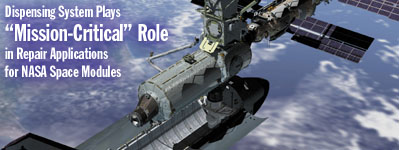
Marshall Space Flight Center, Huntsville, Ala., is developing a kit for the external repair of NASA space modules that incorporates MIXPAC handheld dispensers as an essential part of the patching system. Marshall researchers created KERMIt, NASA’s “Kit for External Repair of Module Impacts,” to seal punctures in the International Space Station that are caused by collisions with meteoroids or space debris. With this kit, crew members can seal punctures from outside damaged space modules that have lost atmospheric pressure. ConProTec, Inc., Salem, N.H., a leading developer of two-component adhesive dispensing systems, manufactures these systems for NASA’s kits.
“We’re pleased to be providing an important element of these NASA kits. MIXPAC systems represent an innovative technology for dispensing adhesives in a wide variety of conditions. When used in patching space modules, the repairs can be done quickly and safely because the dual-cartridge system allows adhesives to be stored for months without cross-contamination and assures the adhesive’s ratio is exact,” states Richard Wilson, ConProTec’s technical director.
NASA developed a kit for external patching for several important reasons:
- It helps to speed repairs, which are often limited by time constraints;
- It provides accessibility to damaged module areas;
- It is ideal for repairing collateral damage; and
- It is compatible with Extra Vehicular Activity (EVA) suits.
Punctures can cause module pressures to drop rapidly, resulting in reductions in the time available for a crew to diagnose the damage, move a repair kit to the problem and patch the leak. Minimal internal accessibility to leak locations by the crew usually will require them to make external repairs; moreover, outside the module, more room is available for repair operations.
A repair kit such as KERMIt has three components: patches, tools and adhesive. The MIXPAC System 400 dispenser is the tool used to inject adhesives when making external patches for space-module repair. MIXPAC dispenser systems consist of a dispenser, a dual-barrel cartridge and a plastic static mixer that work as a completely integrated system.
Two Basic Crew Operations
Patching operations involve two basic crew EVA operations. First, the crew must locate and examine the hole and make preparations for the patching. Then, in a second EVA, the patch is applied by using an adhesive injector or dispensing system. With the adhesive stored in a dual cartridge, the patching operation is simplified and the proper mixing is ensured. Also, with dual cartridges, the catalyst and resin are stored separately, thereby preventing cross-contamination.“Space station crew members faced with making external repairs under time constraints have a dispenser that is ready to be used. They do not need to take the time to mix adhesive components in what is essentially an emergency situation,” adds Wilson.
A key feature of the MIXPAC system contributes to the success of repairs. Dual-cartridge containers are vacuum filled to ensure that no air becomes trapped in the cartridge and that the adhesive is properly metered. ConProTec works closely with NASA to modify the dispenser systems for use outside of a space station or module. An insulating blanket was added to the dispensing system so that it operates effectively in the cold temperatures outside the International Space Station. In addition, since crew members will be wearing heavy gloves while making repairs outside a module, NASA and ConProTec altered the handle design to simplify manipulation of the dispensing system.
The Marshall Center has been developing and testing the KERMIt Patch Kit since 1998, testing for leakage, adhesive flow, crew interface adequacy, etc. It expects to deliver an operational patch kit, which will incorporate the MIXPAC dispensing system as an integral part of the kit.
 Marshall Space Flight Center uses ConProTec’s MIXPAC hand-held dispensing system to quickly and safely repair damaged areas on NASA space modules.
Marshall Space Flight Center uses ConProTec’s MIXPAC hand-held dispensing system to quickly and safely repair damaged areas on NASA space modules.Other Applications
Overall, MIXPAC dispensing systems are proving to be beneficial to NASA as well as many other manufacturers utilizing adhesive dispensing systems. For example, Thiokol Propulsion, a division of Cordant Technologies, Inc., and manufacturer of NASA’s Space Shuttle reusable solid rocket motors, uses a MIXPAC system to dispense epoxy adhesives in the nozzle bond process. Operators insert the dual-cartridge system into the adhesive dispensing gun, attach a MIXPAC static mixer and then easily dispense the exact amount of adhesive necessary.In other applications, manufacturers are realizing higher productivity and cost savings by selecting the easy-to-use and environmentally safe, handheld MIXPAC adhesive dispensing systems. Using these systems reduces the amount of hazardous and material waste that is generated and enhances employee productivity by reducing preparation times. Ratio control is achieved since the integrated system of dispenser, dual cartridge and static mixer ensures that the correct amount of adhesive is dispensed from both sides of the cartridge. Finally, by using a system in which the adhesives are contained in cartridges, employees are not exposed to hazardous material.
Whether they are helping NASA repair space modules quickly and safely, or making adhesive dispensing efficient and effective for a wide range of vendors, MIXPAC systems are increasingly playing an essential and innovative role in a wide array of mission-critical adhesives solutions.
Additional information on MIXPAC handheld dispensers is available from ConProTec, Inc., 8 Willow St., Salem, NH 03079; phone 603-893-2727; fax 603-893-3737; or visit the Web site www.mixpac.com.



